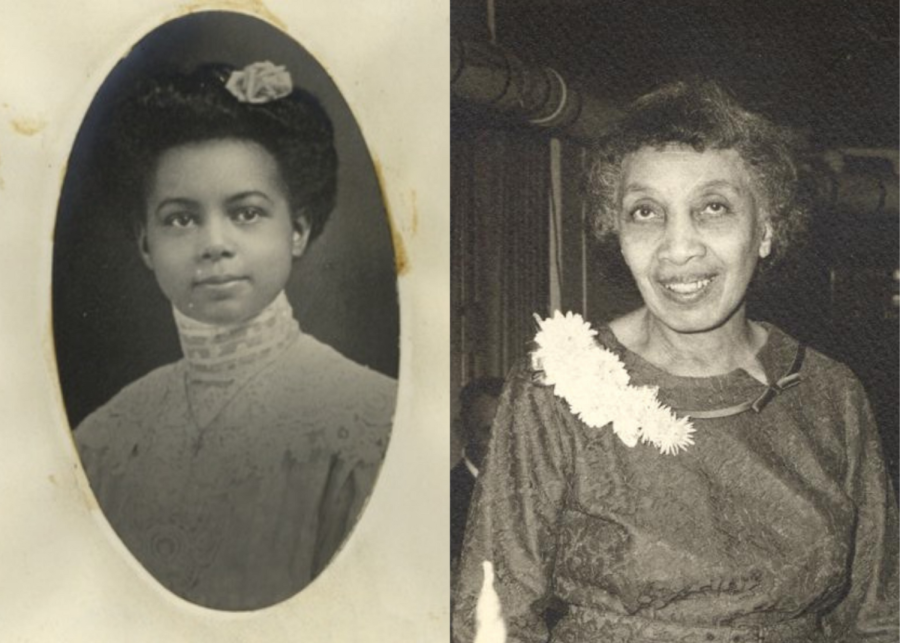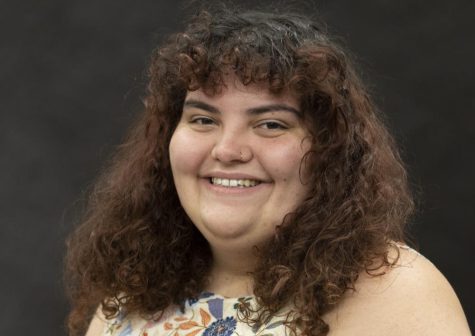Zella Powell and Ona Norton: Looking into the women who Douglas Hall may be renamed after
The Board of Trustees will vote Friday on renaming Douglas Hall after Zella Powell, Eastern’s first Black graduate, and Ona Norton, a Charleston resident who helped house students of color starting in the 1950s.
April 21, 2022
Eastern’s Board of Trustees will vote on renaming Douglas Hall after two Black women who were influential in the university’s history Friday at 1 p.m.
Originally named after a pro-slavery proponent and former Illinois Sen. Stephen Douglas in the early 1950s, the building was named in conjunction with Lincoln Hall to honor a debate that took place in Coles County in 1858 between Abraham Lincoln and Douglas who were competing for an Illinois Senate seat.
Now, after over a decade of debate and Eastern’s Naming Committee reconvening three times to address renaming Douglas Hall, a vote will be taken to rename the residence hall Powell-Norton Hall, to honor Zella Powell, Eastern’s first Black graduate, and Ona Norton, a Charleston community leader who provided housing to students of color.
But who are these women?
Zella Powell
Zella Powell became Eastern’s first Black graduate in 1910.
Before attending Eastern, however, she was born and raised in Mattoon in one of the pioneer families of the city.
Her father, John Powell, was the first child to be born in Mattoon. Born to a barber, he later became a barber himself and was a much-loved member of the community as seen through newspaper articles at the time.
While the family did experience some hardships and racism, Zella Powell’s granddaughter, Stephanie Wright-Griggs, said she was surprised to see just how well-regarded the family was by their community.
“I knew that they were there, they thrived, they survived. They went way beyond surviving. They were looked up to in the community because we were very, we being my sister, myself and my daughter, went to the library in Mattoon, and we were amazed to see how much of their social life was in the Mattoon Gazette,” Griggs said. “We didn’t expect that at all.”
One example of this was an article written on John Powell’s marriage to Zella Powell’s mother, Victoria Barr.
When they married, the Mattoon Gazette, wrote that the couple were “nice people whom we esteem highly and the Gazette gives them its best wishes for a bon voyage over life’s tempestuous seas.”
As the couple’s only surviving child, Zella Powell was active in the community as noted in archives of the Mattoon Gazette.
She decided to attend Eastern to stay close to home and be near her father after her mother’s death.
Wright-Griggs said that was one small part of her grandmother’s legacy.
“Well, you can define legacy in many ways, and I think the most basic one was really have the approach of helping other people. Be proud of who you are. Don’t let people stop you from what you want to achieve. And she inherited that from her parents, and her grandparents. Don’t be afraid to be the first, which was huge, heading off to Eastern Illinois. But then like I said, she was willing and ready to head off… And so she was determined to get an education and have a career, which was kind of different for women those days, too when you think about it,” Wright-Griggs said. “She was ahead of her time as a Black woman during that period of time, and she kept going with it. She wanted to make a difference.”
While Zella Powell never spoke in-depth to her granddaughter about her experiences, Wright-Griggs said she is sure it was a mixed bag.
“When we were younger she talked about it, but she talked about it in passing because, I mean, Black people did not discuss those stories, the struggle, because they weren’t really sure how they’d be perceived by the framework. And a lot of times, they did not want to share that burden. And I’ll turn around and say I don’t know that was a burden for my grandmother’s to the extent of some, but I know it had to be,” Wright-Griggs said. “Because on one hand, I looked at the fact she basically grew up in a pretty predominantly white community. So she had a different sense of expectations, just having lived in that environment versus people who weren’t in that environment.”
After graduating, Zella Powell married Albert Lovett and the two lived together in Chicago with their child, Louise.
Much like her parents, Louise Lovett valued education. After earning her two degrees, she was working as a librarian when Charles Wright came into her life.
Charles Wright led the charge in establishing the Museum of African American History in Detroit, the museum that is home to the world’s largest permanent collection of African American cultural artifacts. It was later renamed the Charles H. Wright Museum of African American History to honor its founder.
Within the museum, the Louise Lovett-Wright Library honors Zella Powell’s daughter for her role in the museum’s founding.
University President David Glassman is proposing Zella Powell be part of the renaming to honor her as a member of a pioneer family of Coles County and as Eastern’s first Black graduate.
Ona Norton
Ona Norton was also a member of a prominent Black family in Coles County and a Charleston resident for more than 90 years.
Before marrying her husband, Kenneth Norton, Ona Norton grew up in Charleston school system.
In an interview in 1990, she recounted a story from her time in school, saying a group of boys began calling her names that she did not care to repeat. She told her mother about the issue and later, when her mother heard the boys calling her names, her mother spoke to the superintendent and the boys were reprimanded.
Ona Norton also took some classes at Eastern before she married.
She worked in many areas in Charleston, including her parent’s restaurant on the Charleston square, Edman’s Bus Station, Charleston Country Club, in a home for people with disabilities, Cambridge Court and Charleston Manor.
Also working as a beauty operator, Ona Norton gave the first perm in Charleston.
One of her most well-known contributions to the Charleston and Eastern communities, however, is her and her husband’s efforts in housing Black students.
Ona and Kenneth Norton were approached in the 1950s by former Eastern football coach Ralph Kohl and asked for help in finding housing for Black students from the Chicago area.
The couple rearranged their home and were able to house seven young men. The next year, they were asked to help find housing for Black women as well.
Eventually, the couple housed Black students in two homes, one for men and one for women.
In addition to opening their home(s), the couple also helped other Black people in the community find housing in Charleston.
Ona Norton was commended for her active role in the community. Not stopping at her work and assistance with Eastern students, she also volunteered with senior citizens for much of her life, within her church and the Charleston Civic Association.
Throughout her life, Ona Norton was honored with a scholarship in her name through a scholarship established by the Concerned Citizens of Charleston, as the Charleston Chamber of Commerce’s 1967 Woman of the Year and as an honor awardee by the Concerned Citizens of Charleston in 1967.
A scholarship in her name is still awarded to Black Eastern students with a 3.5 or higher grade point average who have made a significant contribution to the Charleston or Eastern community through their service.
Glassman is proposing honoring Ona Norton as a part of the renaming to honor her as a pillar of the Charleston community and for her work in helping Black students finding housing.
Those wishing to speaking during the public comment portion of the meeting can email board secretary Audrey Edwards at [email protected]. Those interested in speaking specifically before the Douglas Hall vote should specify that they wish to speaking during that period of public comment.
There will be 20 minutes total for the portion of public comment focused on the Douglas Hall renaming.
People can also comment by emailing Edwards at the email address above. Those comments will be printed and shared with the trustees at the meeting.
Corryn Brock can be reached at 581-2812 or at [email protected].




















































